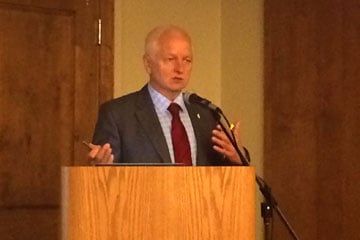 Dr. Rewers talks about advances in diabetes research at Aspen Ideas Festival
Dr. Rewers talks about advances in diabetes research at Aspen Ideas Festival
With worldwide rates of childhood diabetes on the rise—patient numbers double every 20 years—the race is on to discover a vaccine or possibly a special diet to stem the disease.
Dr. Marian Rewers, MD, Ph.D., professor of pediatrics and clinical director of the Barbara Davis Center for Childhood Diabetes at the Anschutz Medical Campus, spoke about advances in diabetes research during a Spotlight: Health segment of the Aspen Ideas Festival last week. Rewers and many other Anschutz Medical Campus colleagues were prominently featured during Spotlight: Health, giving a prestigious platform on which to raise the profile of the groundbreaking research and transformative health care occurring at the Anschutz Medical Campus.
Aspen Ideas Fest
The Anschutz Medical Campus is a sponsor of the 2014 Aspen Ideas Festival. Leading physicians and scholars from CU Anschutz share their insights and research with the festival's 3,500-plus attendees from June 24-July 3.
The high-profile forum of The Aspen Ideas Festival, especially the three-day Spotlight: Health, offers an ideal platform on which to raise the profile of the Anschutz Medical Campus.
"The festival takes place in Aspen, our own backyard, and attracts attendees from around the country and the world," said Leanna Clark, vice chancellor of University Communications. "The Spotlight: Health focus ensures that we are getting the Anschutz Medical Campus brand in front of the foremost academics, policy makers, practitioners, industry executives, philanthropists and concerned citizens, and engaging them in the conversation to transform health and health care."
Rewers, one of the nation's leading clinical researchers of diabetes, explained that environmental factors are the main cause of type 1 diabetes. "We've seen in the past 50, 60 years this relentless epidemic of childhood diabetes," he said. "Wherever you go—Europe, the U.S.—you see the same pattern. Every 20 years there are twice as many kids diagnosed with type 1 diabetes, so it cannot be caused by any genetic shifts. It has to be something coming out of the environment. ... In addition, it has to come at a vulnerable time—probably in the first year of life."
Rewers is the principal investigator of large National Institutes of Health-funded prospective cohort studies. He is heading the Colorado center as well as co-chairing the steering committee of The Environmental Determinants of Diabetes in the Young (TEDDY) study.
"We've screened almost half a million newborns in four countries—the United States and in Europe—and we're following 8,000 of those who are at very high risk for 15 years to find those elusive environmental factors," he said. "This will hopefully lead to the development of a vaccine or special diet and, ultimately, the prevention of childhood diabetes."
Rewers also discussed the rapid increase in type 2 diabetes, including in the United States, where one in three Americans born in the year 2000 will develop the disease. Worldwide, 366 million people have type 2 diabetes, and that number will increase to 552 million by 2030 (51 percent increase). The United States is forecast to see a 36 percent increase in type 2 diabetes cases over the next 20 years, he said.
Rewers pointed out that a mountain climber named Andrew Hamilton, who, as the Aspen Ideas Festival was taking place, planned to climb all of Colorado's 14,000-foot-plus peaks in just 10 days. "I'm positive he won't develop diabetes," he said. "If we just expended as much energy as we're eating every day we wouldn't have a problem."
 The audience had many questions for Rewers, including this one from Lilly Marks, University of Colorado vice president for health affairs and executive vice chancellor of the Anschutz Medical Campus: Are the new drugs being developed to treat diabetes making measurable differences in health outcomes or are they just raising the cost of drugs?
The audience had many questions for Rewers, including this one from Lilly Marks, University of Colorado vice president for health affairs and executive vice chancellor of the Anschutz Medical Campus: Are the new drugs being developed to treat diabetes making measurable differences in health outcomes or are they just raising the cost of drugs?
"The latter," Rewers said. In the United States, pressure from individuals and patient advocacy groups is so tremendous that "drugs that should not be on the formularies are added just for the sake of trying something new. They may lower a patient's A1c levels (standard measure of glycemia in the blood), but just by 0.5 percent. It's not sufficient. You need to lower A1c by 2 percentage points," he said. "None of these drugs, or in combination, have been shown to do that."
He noted that some of the world's best care for diabetes patients as well as research into the disease takes place at the Anschutz Medical Campus. The Barbara Davis Center for Childhood Diabetes is "considered the No. 1 center in the world for type 1 diabetes care." In addition, the Anschutz Health and Wellness Center and the NIH-funded Center for Human Nutrition, headed by James O. Hill, Ph.D., are "doing amazing things," Rewers said, in terms of obesity research as well as the promotion of healthy living.
